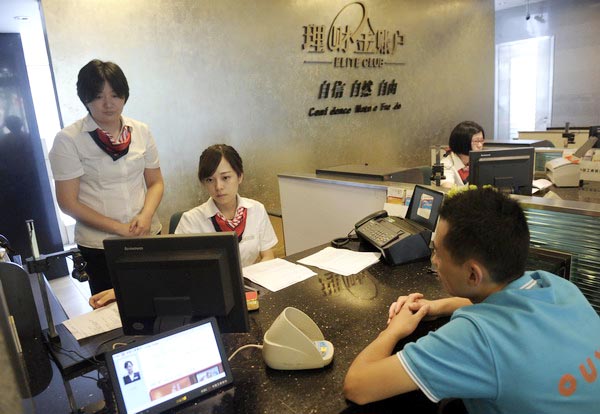Governor says various tools could be used to boost economic growth
Expectations of a further cut in the reserve requirement ratio for banks were dampened after the central bank surprised analysts on Tuesday by injecting 220 billion yuan ($34.6 billion) into the banking system through 7- and 14-day reverse repurchase agreements.
Some analysts had read signs in recent policy actions that the People's Bank of China was unwilling to cut the RRR to boost the economy, preferring to use money market operations instead to deliver liquidity injections to the financial system.
|
 A customer buys wealth management products at an Industrial and Commercial Bank of China Ltd branch in Nanjing, Jiangsu province. The People's Bank of China made record reverse repurchase operations, totaling 220 billion yuan ($34.6 billion) on Tuesday, dampening expectations of a further cut in reserve requirement ratios. [Photo/China Daily] |
Asked at a news conference if he favored money market operations over interest rates or the RRR to manage policy settings in the current environment - which has seen warming property sales - Zhou Xiaochuan, governor of the central bank, said the use of "either tool can't be ruled out".
Tuesday's operation marked a record daily high of its kind, and indicated that 133 billion yuan has been injected into the market this week, against an expected 87 billion yuan due in the same week, according to data compiled by Shanghai Wind Information Co Ltd.
China's overnight money market rate fell the most on Wednesday in seven weeks following the move, according to data compiled by Bloomberg.
"Surely cuts in the RRR would be put off after the large-scale reverse repos. It seems the central bank prefers to release liquidity to banks in a more selective way and increase the monetary base, which cannot be achieved by a RRR cut," said Chen Daofu, policy research chief of the Financial Research Institute at the State Council's Development Research Center.
He added the central bank has hesitated to cut the RRR mainly because the capital outflow prospects are very unclear as present.
"There are signs that capital outflows have probably fallen substantially in the first half of August, in contrast to a big jump in July," he said.
A report by Nomura Securities estimated capital outflows from China rose to $27.2 billion in July from $25 billion in June.
The central bank's frequent use of reverse repurchase over the past eight weeks was in accordance with its statement in a quarterly report released earlier this month, which ranked reverse repurchase operations at the top of the instrument list, said analysts.
A warming in property sales in major cities in July and expectations of further rises in August have also restricted room for more RRR cuts in the short term, as the authorities have taken measures to cool down home prices for more than two years, said Fu Xiongguang, an analyst at Citic Securities.
But Wang Jun, a senior analyst at the China Center for International Economic Exchanges, said resorting to reverse repurchases cannot solve the long-term liquidity shortage and a cut in the RRR is urgently needed.
"The move could only guarantee banks have more money, but without a lower RRR, they cannot lend out more money to companies."
He said the current RRR of 20 percent for major lenders is too high for the current economic conditions, and further cuts to 18 percent should materialize soon.
"The bigger the amount of reverse repos this week, the bigger the redemption next week. It cannot solve the real problem."
To shore up the softening economy, the central bank lowered the RRR for commercial banks in February and again in May. It also cut interest rates in June and July.
